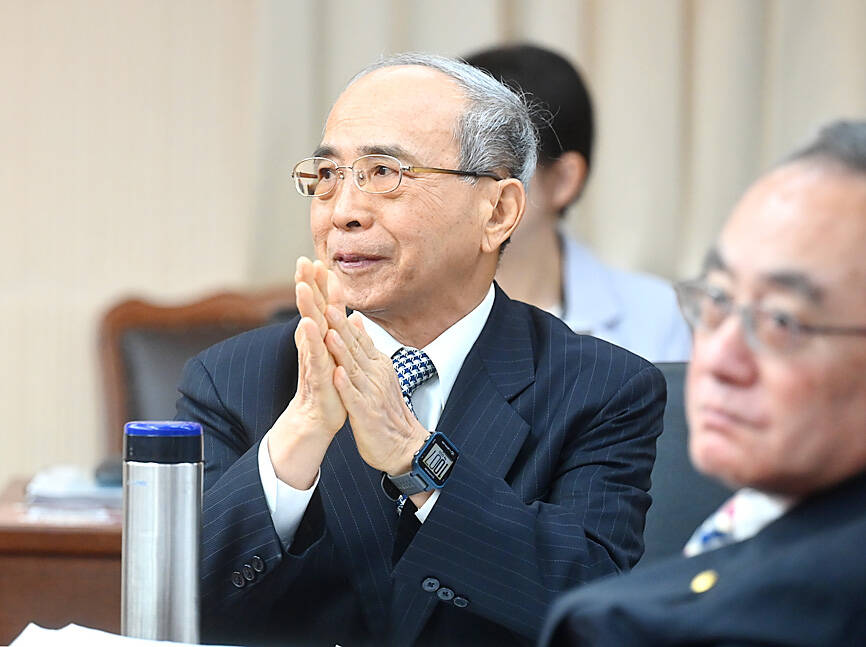Lawmakers yesterday urged the Taiwan Transportation Safety Board (TTSB) to work with the Ministry of Transportation and Communications to regulate online sales of so-called “miraculous self-driving devices,” which they said could compromise road safety.
TTSB Chairperson Lin Shinn-der (林信得) was invited by the legislature’s Transportation Committee to give a briefing about the agency’s performance in the past fiscal year.
Chinese Nationalist Party (KMT) Legislator Hung Meng-kai (洪孟楷) raised concerns about hazards that could be caused by “miraculous self-driving devices,” which drivers can purchase online for NT$300.

Photo: Wang Yi-sung, Taipei Times
The advanced driver-assistance system (ADAS) is designed to relieve drivers’ burden, not to replace drivers, Hung said, adding that it has been proven that misusing ADAS could lead to traffic accidents.
Drivers are told that they must still place both hands on the steering wheel even when using ADAS, but the device can simulate the experience of hands on the steering wheels and essentially encourages drivers to remove their hands, making it a public hazard, Hung said.
Sales of the device continue despite the ministry warning sellers that it might contravene the Road Traffic Management and Penalty Act (道路交通管理處罰條例), Hung said.
The board should work with other government agencies to regulate the device and ban drivers from using them, he said.
Lin pledged to discuss the issue and possible solutions in one month with the transport ministry, the Ministry of Digital Affairs and Ministry of Economic Affairs.
Taiwan does not have a 100 percent autonomous driving system yet, Lin said, adding that cars in Taiwan have mostly auxiliary driving systems.
“We have investigated accidents related to the use of ADAS and published suggestions for improvement last year,” Lin said.
The Freeway Bureau has also posted reminders of the limitations of the automatic assisted driving system on electronic display boards on freeways, he said.

Taiwan has received more than US$70 million in royalties as of the end of last year from developing the F-16V jet as countries worldwide purchase or upgrade to this popular model, government and military officials said on Saturday. Taiwan funded the development of the F-16V jet and ended up the sole investor as other countries withdrew from the program. Now the F-16V is increasingly popular and countries must pay Taiwan a percentage in royalties when they purchase new F-16V aircraft or upgrade older F-16 models. The next five years are expected to be the peak for these royalties, with Taiwan potentially earning

STAY IN YOUR LANE: As the US and Israel attack Iran, the ministry has warned China not to overstep by including Taiwanese citizens in its evacuation orders The Ministry of Foreign Affairs (MOFA) yesterday rebuked a statement by China’s embassy in Israel that it would evacuate Taiwanese holders of Chinese travel documents from Israel amid the latter’s escalating conflict with Iran. Tensions have risen across the Middle East in the wake of US and Israeli airstrikes on Iran beginning Saturday. China subsequently issued an evacuation notice for its citizens. In a news release, the Chinese embassy in Israel said holders of “Taiwan compatriot permits (台胞證)” issued to Taiwanese nationals by Chinese authorities for travel to China — could register for evacuation to Egypt. In Taipei, the ministry yesterday said Taiwan

Taiwan is awaiting official notification from the US regarding the status of the Agreement on Reciprocal Trade (ART) after the US Supreme Court ruled US President Donald Trump's global tariffs unconstitutional. Speaking to reporters before a legislative hearing today, Premier Cho Jung-tai (卓榮泰) said that Taiwan's negotiation team remains focused on ensuring that the bilateral trade deal remains intact despite the legal challenge to Trump's tariff policy. "The US has pledged to notify its trade partners once the subsequent administrative and legal processes are finalized, and that certainly includes Taiwan," Cho said when asked about opposition parties’ doubts that the ART was

If China chose to invade Taiwan tomorrow, it would only have to sever three undersea fiber-optic cable clusters to cause a data blackout, Jason Hsu (許毓仁), a senior fellow at the Hudson Institute and former Chinese Nationalist Party (KMT) legislator, told a US security panel yesterday. In a Taiwan contingency, cable disruption would be one of the earliest preinvasion actions and the signal that escalation had begun, he said, adding that Taiwan’s current cable repair capabilities are insufficient. The US-China Economic and Security Review Commission (USCC) yesterday held a hearing on US-China Competition Under the Sea, with Hsu speaking on